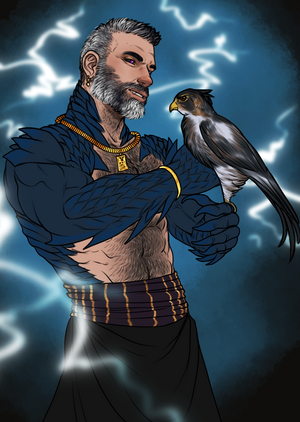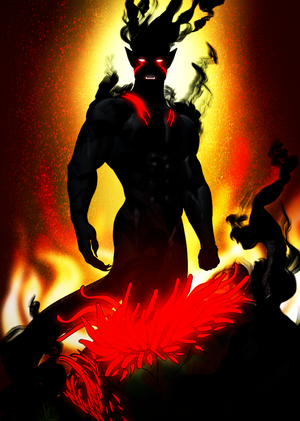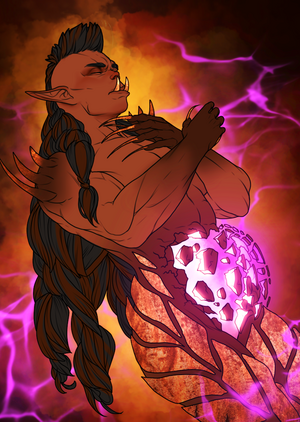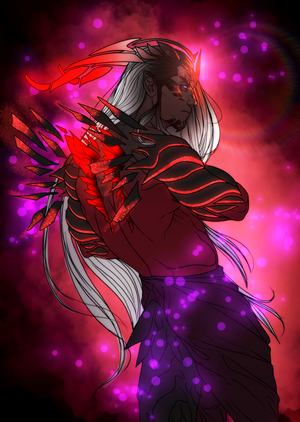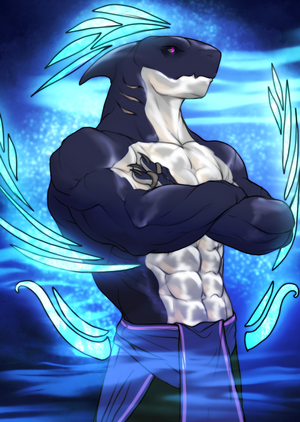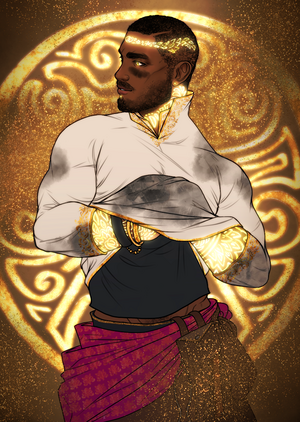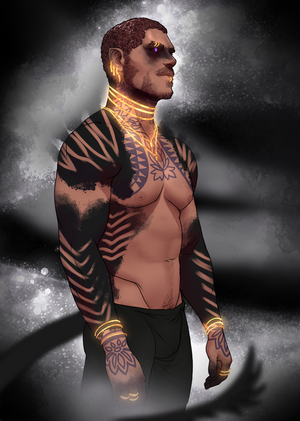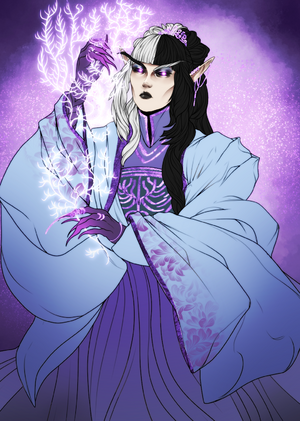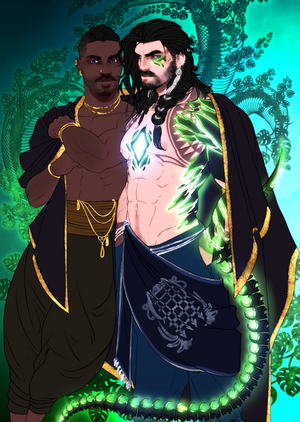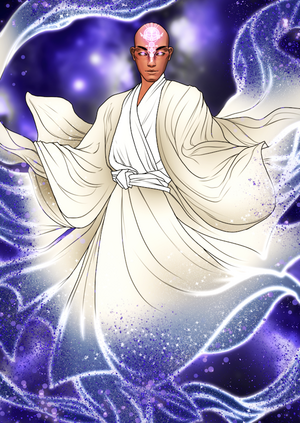Test1: Difference between revisions
No edit summary |
No edit summary |
||
| Line 97: | Line 97: | ||
| style="font-weight:bold; width:75px; vertical-align:top;" | Description | | style="font-weight:bold; width:75px; vertical-align:top;" | Description | ||
| style="vertical-align:top;" | | | style="vertical-align:top;" | | ||
|- | |- | ||
| style="font-weight:bold; width:75px; vertical-align:top;" | Virtues | | style="font-weight:bold; width:75px; vertical-align:top;" | Virtues | ||
Revision as of 06:07, 26 May 2024
| Test1 | |
|---|---|
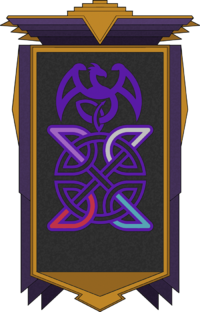 | |
| Religion | |
| Pronunciation | Dra-konism |
| Origins | Unknown, presumed over 70.000 years ago |
| Deities | |
| Regulus, Caius, Daiana, Triton, Nox, Marik, Severena, Aurora. | |
| Subsects | |
| N/A | |
Origins
Core Beliefs
At its simplest, Draconism is a religion that holds the Dragons as Gods, creators of the world, and all living things in it. Most religions acknowledge the existence of Dragons and their mechanical control over creation, but Draconism is the only Religion that focuses on the Draconic personas as divine paragons of virtue (and vice). Historically, Draconism was less of a Religion and more of a cult in which mortals projected certain values on the Dragons, that they loosely acknowledged but never fully invested in. Draconism was always a fairly light religion, as the Gods never reinforced religious Dogma, until The Advancement.
The Advancement
The Advancement is an event that occurred in 312 AC, when the Dragons committed to fulfill the functions of Gods for Draconism, rather than tacitly condoning its existence with occasional affirmation. The event that precipitated The Advancement was the death and rebirth of Caius, who after suffering 13,000 years from a consuming Void-sickness, finally died, and was reborn as Cinerius. With an impending religious schism in the already fracturing Draconic faith, the Dragon Regulus led a conclave of Dragons in which they agreed on new policies and dictates and created the Draconism afterlife while passing the will of the Gods down to all believers.
The Dragon Conclave
At a baseline, all Draconists should be inspired and live by the example of the virtues of their Gods. However, the Draconism Gods are divided over 3 distinct Pantheons of 4 Dragons each. Each Draconism worshiper chooses to belong to one of these Pantheons, and adopts their ideology on The Presence. The Presence is a new term used by the Dragons to refer to what they previously called The Infection, all things Magical and not of Aloria's reality. During The Advancement, the Dragons effectively abandoned full extermination of extraplanar Magic, but they still have different views on how to interact with things not of the world of Aloria. Individual virtues can be found on the God descriptions, the Pantheons are explained below. Note, there is a minor exception to all the below. Any Ordial-Aligned Person/Spirit that is somehow tied to the Malefica, Machinist, or Consigner, cannot be tolerated even by the Successors. Those Persons/Spirits must either be cleansed to be interacted with, or removed from Aloria and the living.
- The Consolidation is the Pantheon of the Dragon Gods Regulus, Triton, Marik, and Gaia. The Consolidation represents the desire to create space for The Presence, but with compromises.
- To resolve Spirits: The Consolidation supports Nature Binding of Spirits, but also insists on cleansing their Extraplanar Magic, or converting it to God Magic (Draconic Magic)
- To resolve Mages: The Consolidation supports the inclusion of Mages, but insists that under no circumstance Sinistral Magic is used, and those who do are Anathema.
- To resolve Afflicted: The Consolidation continues the fight against the Afflicted, believing them to have no place in the world of Aloria due to their nature.
- The Annexation is the Pantheon of the Dragon Gods Severena, Aurora, Nox, and Orion. The Annexation represents the desire to create space for The Presence, but only on their terms.
- To resolve Spirits: The Annexation supports Shard Binding of Spirits, which in turn shuts off all their Magic making them Mundane, an in essence Bound Automata.
- To resolve Mages: The Consolidation tolerates Mages, but insists on declaring Sinistral users Anathema, and also insist Magic usage is kept to an absolute minimum with no frivolous entertainment uses.
- To resolve Afflicted: The Annexation continues the fight against the Afflicted, believing them to have no place in the world of Aloria due to their nature.
- The Succession is the Pantheon of the Dragon Gods Cinerius, Umbra, Felicula, and Daiana. The Succession represents the desire to include The Presence in the fold with as few rules as possible.
- To resolve Spirits: The Succession supports Nature Binding of Spirits, and makes no further changes. Their only requirement is that Spirits accept real feelings and a consciousness.
- To resolve Mages: The Succession supports the inclusion of Mages with no requirement other than that they use Sinistral Magic only in desperation or need, and rely on Dragons to fix the damage to the world.
- To resolve Afflicted: The Succession supports fighting the Afflicted where they embody the sins of Draconism, but otherwise proposes compassion and forgiveness to cursed mortals.
Old Believers
Draconism has a variety of smaller regional Cults called Old Believers. The Old Believers hold onto the Draconism Radicals as they were before The Advancement. Choosing to play an Old Believer is not recommended, because it cuts a Character off from the other Draconism worshipers. Even though Old Believers are not strictly heretics, they might be excluded from social activities or Pantheon-related quests. Old Believer information is preserved specifically for Character who felt betrayed by The Advancement, or sensed a sinister intention in the actions of Umbra, and want to continue Caius's Burning Extermination.
Gods and Goddesses
Draconism has a total of 12 Gods, split equally over 3 Pantheons. Unlike Fornoss where it is possible to worship only one specific Pantheon, Draconists must worship all Gods of all Pantheons equally. They may however choose one specific Dragon God(dess) who they particularly feel represented by or connected with, and that will be their Patron God(dess). Conflict between Draconists generally speaking only exists on ideological lines with how to deal with Spirits/Mages/Afflicted, but this conflict should never be so deep as to fracture the believers. There is general permission for the faithful to disregard/refuse assistance/ridicule/denigrate if something happens that violates their Pantheon's Ideology, but they should never attack, exclude, or sabotage other Draconism worshipers outright.
Regulus, the Blue King Dragon
| Description |
Regulus is a complicated Dragon for a variety of reasons. As a recently awoken Dragonsoul from a mortal host, Regulus has lived both the life of a mortal Ailor, and now an immortal Dragon. Equally, this Dragon is meant to be the conclave leader and mediator who keeps peace between Dragons who are likely to feud both over their territory, and ideologies. This contrast between a mortal life and an immortal one has brought both great progress through revolutionizing the way Dragons have thought about the way the world works, but also great chaos. The old Regulus harkens to tales of regalness, composure, and sagely words. The modern iteration is often seen as a capricious clown who somehow stumbles into making the right decision by accident while obfuscating everyone with nonsense words, or unpredictable outbursts of bad temper. Despite all of this, Regulus is credited with having returned nearly all the Dragons to material reality with his Draconic allies, including the help of Regalia's Dragon Cult. While he makes many missteps on the way to progress, he is still seen as the one true leader of the Draconic conclave, especially because he was once a mortal, which brings in a unique perspective that the other often detached or haughty Dragons are unable to empathize with. In he many tangible interactions Regulus has had with mortals in Regalia and beyond, he perhaps imparts one of the most important lessons of all, in that the faithful shouldn't take themselves, their task, or any obstacles they face too seriously, and that people can legitimately die from lack of laughter and joy or loneliness. | |
| Virtues |
Regulus imparts the most important virtue among all the Draconists, which has remained unchanged between his reincarnations, which is the preservation of life. To all Draconists, preserving life and fighting for the preservation of life in small or big ways is always a virtue. This can include being a nurse or doctor, fighting to protect the innocent and weakened who could otherwise not stand up to defend themselves, or ridding the world of particularly corrupted and evil persons and beings who cause death beyond what natural causes have been ordained by Umbra. | |
| Vices |
The greatest vice that Regulus preaches against, is idleness and inactive centrism. Due to Regulus rather fence-hopping attitude towards problems in the past, the concept of enlightened centrism had become a virtue among the Draconists. Ambition and drive to make the world a better place is anemic to centrism however, because institutionalized systems of abuse and loss become impossible to fight if those that should fight try to play the middle-ground. Regulus stands for true moderation and mediation, not passivity in the face of turmoil or trouble. | |
| Association |
Regulus as a past incarnation and present, has a strong association with the Anglian-Ailor people in the Regalian Archipelago. His domain has historically been the whole Archipelago, and as a Dragon, Regulus controls the weather around the world, bringing forth rain and thunder, and heralding the change of the seasons and temperatures. It is by his personal involvement that Anglia when it was settled by the Aml Tribes developed a pleasant and mild climate with fertile soil which was perfect for farming. As such, many also see him as a patron of those that produce food and work with plants. |
Cinerius, the Red Passion Dragon
| Description |
Cinerius was once known as Caius, the first Dragon to peer into the Void when it first opened, and whose curiosity caused him to become infected with a lethal Void sickness that slowly consumed him. After suffering painfully for 13,000 years Caius succumbed, but from his corpse was born Cinerius the first true Dragon rebirth. Cinerius is in many ways a true return to the roots of Caius, a god of fire and passion from where all drive and ambition and urges come. Cinerius lights the flames of want and need, and makes mortals feel all the right things that make living so rewarding, and why even Demons can be seduced to care about the world they were made to destroy. There is perhaps an irony there, that when Caius's soul was split in two, and Triton first entered the Void, it brought with him the hunger for life that was created by Caius, thus infecting the Demons that then spilled forth into Aloria, who in turn made Caius's sickness worse until Cinerius was born. This has made Cinerius so much more concentrated in his essence, the reason he is depicted as an entity that mortals cannot bear to look at, because even the sight of him would reveal passions and deep desires in their soul that they weren't even aware of, or are too ashamed or fearful to give into. Cinerius also has the other aspects of Caius, in that he is a Dragon of love and family, of feelings and emotions and all the things that give color to life. It was Caius who first willed free will and feelings onto lifeless beings of creation, and Cinerius who now perfects this ancient decision with a deeper connection to revelations about the inner soul. | |
| Virtues |
Cinerius's virtues are to love and feel unconditionally and without restraint. Cinerius places above all the need to be in touch with one's inner wants and needs, and the brazen bravery to reveal them to others, and to act on them, so long as they do not outwardly harm others (and sometimes, even when they do). Cinerius teaches bravery not to bottle up one's feelings, not to withhold one's true thoughts, and to express feelings that are had before the limited time that all mortals (and even immortals, apparently) have, is taken away. His virtue is to celebrate one's loved ones and family. | |
| Vices |
Cinerius's greatest desire and where his fires rage loudest, are at the idea of being snuffed out of history without having achieved anything. For Cinerius, there is no greater failure for the individual soul, than to have no ambition, no drive, but above all to have meant nothing to the lives of others, or to the endless rotation of Aloria as it hurtles through the great nothingness of Orion. Rather than a contradiction to Orion's detached enlightenment, this vice and Orion's virtue are complimentary, to achieve enough in life, and reach detachment towards the end for having done enough to make a difference. | |
| Association |
Cinerius has inherited Caius's associations with the Eronidas, and Guldar, as well as the Maquixtl. Caius's historical domain was Guldar and Junction West, marking him as one of the most important Dragons. Cinerius has continued this association but seems more somewhere in the middle of Eronidas and Maquixtl from his silhouette, rather than Eronidas-dominated in the past. In the Immortal War, Caius was the general of the Draconic forces, and largely responsible for picking the battles between the Dragons and Draconic forces, and as part of his continuing succession, Cinerius has taken over this role also. |
Daiana, the Gray Dreaming Dragon
| Description |
Daiana is a Dragon in a categorical sense, but she is actually the planet of Aloria itself, though whether she is all of it or only the core of the planet, is unclear. Her exact nature within Draconism is quite unclear, but she has been attributed to the Soul Rivers which are a form of invisible arteries of the world that seed life, and the cycle of birth. While Aurora makes the bodies of creation and Orion lifts them into the afterlife after Umbra has killed them, Daiana creates the seedlings from dead soul matter to seed new life in newborns and thus create new souls. Another aspect of her is that she creates all the Gods of other Religions, at least the Aloria-native ones, though not directly. It is said that Daiana dreams the wills, ambitions, hopes, and fears of the people of societies without divine guidance because they live on her and their feelings affect her as the planet itself. In turn, she dreams of these things, and in doing so manifests the Gods. It is thus not exactly correct to say that she creates the Gods exactly, but that mortals feed her with information, using her dreaming as a conduit to wish into existence their own Gods for divine guidance. It is important in this regard never to appraise Daiana as some mother-Goddess of all Gods because they owe no loyalty to her but to their own followers. Daiana as a Dragon has never been met in person, because as the planet (or its core), she is incapable of manifesting in a humanoid form, though she does produce Godborn through her Dreams who do call her mother. They, and some other Archon, may occasionally perceive visions in which they do see her. | |
| Virtues |
A virtue for Daiana is environmental conscientiousness. Her virtue is not exactly complete environmental protectionism, to some degree Draconists do acknowledge that the planet has the means to heal itself and restore the functions of any ecosystem. Aurora, Daiana, and Gaia can reasonably restore lost plant and animal life and even recover certain geological features, so an occasional factory or strip-mine won't destroy the world. Magic however, is something these three Dragons have difficulty counteracting, so a virtue is to remove lingering corrosive magic from environments. | |
| Vices |
A vice for Daiana is disregard for the value of a life. This may sound similar to Regulus's desire to see murderers and killers punished for ending lives, but it's more about the treatment of the living, than the dead. Forms of disregard for the value of life include slavery, domestic abuse, or just the complete disregard of a person's value in society or group, no matter how outcast they are. To Daiana, each life and each soul has a story to tell, and being forced in bondage or horrible conditions is a mistreatment of the value of a soul's story, and that can include Spirits within The Succession. | |
| Association |
Daiana has no true domain over which she supposedly rules, though caves have often been associated with her presence. Daiana is considered an elemental ancestor Goddess to the Eronidas, so they have completely embraced her as "Mother Ersetum", which could roughly be translated to Mother Earth in Common. Much of Eronidas ancestral spirit worship and shamanism is inspired by her, and so Daiana often appears as an Eronidas in Dreams, while many of her Dreamborn God-children are Eronidas or Half-Eronidas. She is also often called Spirit Mother for her role to their place in Draconism. |
Triton, the Black Chain Dragon
| Description | ||
| Virtues | ||
| Vices | ||
| Association |
Nox, the Teal Unseen Dragon
| Description | ||
| Virtues | ||
| Vices | ||
| Association |
Marik, the Brown Etherforge Dragon
| Description | ||
| Virtues | ||
| Vices | ||
| Association |
Umbra, the White Twilight Dragon
| Description | ||
| Virtues | ||
| Vices | ||
| Association |
Felicula, the Yellow Harmony Dragon
| Description | ||
| Virtues | ||
| Vices | ||
| Association |
Severena, the Green Stalwart Dragon
| Description | ||
| Virtues | ||
| Vices | ||
| Association |
Aurora, the Purple Creation Dragon
| Description | ||
| Virtues | ||
| Vices | ||
| Association |
Gaia, the Indigo Nature Dragon
| Description |
Gaia is not a Dragon exactly, but a mortal Aelrrigan Knight named Iorwerth (depicted right) who was an Archon serving the Dragons, carrying the soul of the dead Dragon Gaia. For centuries, Iorwerth was forced to serve the Malefica, one of the greatest unseen enemies of the Dragons, forced to conjure up vast magical structures, mazes, and fortresses for the Malefica and its Shades to use to deal death on mortals in the living world. He was forced to do this because his lover Cadell's (depicted left) soul had been captured by the Malefica, who used him as a bargain to string Iorwerth along. Through the intervention of mortals in Regalia, Iorwerth and Cadell were able to break free from the Malefica's control, and return to Aloria. There he rekindled with the Dragons he once served, but also still held the power of Ordial god-hood. For this, the Dragons tasked him to ascend to their pantheon by being the (somewhat reluctant) host of Gaia's Dragon Soulspark, a Dragon who had perished many centuries ago during the Denial of Immortality. While many of Iorwerth's structures still serve the Malefica, all have become overgrown with lush vines and the Lillies of the Valley, Iorwerth and Cadell's favorite flower. In this, Gaia's powers manifest as the Dragon of Nature, the other half of Aurora's Craters of Creation. While she created the living beings that inhabited nature, it was Gaia who created the plants and trees and flowers that decorate all the realms. Thus, carrying life and death in his body and his love by his side, Iorwerth is the Draconic God of Nature, tranquility, absolution, and redemption in rebirth. | |
| Virtues |
Virtue to Gaia (This God is both called Gaia and Iorwerth) is preserving balance of nature, in the give and take between the forces within an ecosystem, and preventing cascade collapse due to dying flora. From the smallest of maggots, to the largest of mammals, nature exists as the bedrock of life on Aloria. Iorwerth specifically adds to this, by making the act of redemption both in receiving and offering others the chance, a true virtue and to never give up in the face of even the most malicious of death-bound forces to return to a righted world and make amends. | |
| Vices |
Vices to Gaia, are the stupidity and naivety to outsmart forces greater in power than the self. In this, Iorwerth and Cadell's centuries-long imprisonment in the Beyond acts as a deterrent and a warning that evil forces are not interested in playing fair or honest, and that respecting duels or challenges of powerful entities is foolish. Iorwerth and Cadell express above all that it is a Vice to not seek help, to not ask for saving, and to foolhardy insist that the individual can overcome all trials and struggles alone. Gaia looks down on lone wolves who risk others with their own recklessness. | |
| Association |
Prior to merging with Iorwerth, Gaia was primarily seen and worshiped among the Dregodar Cults in the Allorn Empire, where he and Aurora were most visible to the Allorn Elves. Through some process that is not well understood today, Gaia and all other Nature Dragons were killed by the Allorn , causing the flight of Aurora and Dregodar. Now, Gaia is more associated with Kintyr and the Breizh people, due to Iorwerth and Callus's Breizh nature. Effigies to Gaia or Iorwerth are often placed in buildings built by Draconists, sometimes even secretly. Gaia's historical domain is south Daen. |
Orion, the Ivory Cosmos Dragon
| Description |
Where Severena is both the spiritual and secular leader of the Sihai people, Orion functions like the exemplar spiritual ambition of the Sihai people. While Severena teaches the people detachment from material possession, attachment, and trauma, the worshipers acknowledge that Severena's functions in the world are rooted in attachment, and that she can never reach enlightened existence. Orion is however that enlightened existence made manifest. They are the only Dragon that exists outside of what Draconists call the Terrasphere, a boundary between the breathable air of Aloria, and the immaterial beyond in the cosmos. Orion is the Dragon of the stars and the Celestial Bodies (Planets, Moons, and Sun). They exist in a state of perpetual detachment from the events of Aloria itself, because they are not bound to it by any intention or purpose other than their loyalty and membership of the Draconic conclave. Historically this has meant that Orion was not traditionally present in the Draconist Pantheon, they were more a cultural symbol for the Sihai, but since The Advancement, Orion has taken a more direct role in the lives and virtues of mortals on Aloria. It was Orion whose sober detachment from the world, allowed for them to take on the task of creating and shepherding the afterlife of Draconism among the stars. They are the ferry-person who delicately fetches the wandering souls from the Soul River after they have passed on, and weaves stars and constellations as their souls are carried into the enlightened immaterial. In short summary, Orion has become the guardian of the Draconic afterlife. | |
| Virtues |
Orion is the patron of Draconism priests and mortuary people, those who perform rites for the dying and the dead, and those offering religious services. To many, their greatest quality is their detachment from material obsession, from desire to own and consume, or from holding on to painful memories and wishes of vengeance. Virtues to Orion, are charity in possessions, temperance in want, and forgiving of the wrongs that have been done to either the person themselves or society at large. A less common virtue, is the acceptance and inclusion of atheists to hold a protected place among Draconists. | |
| Vices |
Orion's greatest vice is directly related to Draconism as a religion itself. While other religions loosely acknowledge Dragons as the tenders of the material world's operating functions, their divinity is only acknowledged among Draconists. However, the fact that their Gods are ever-so-slightly more important than other Gods to the functioning of the world, breeds some kind of smugness or self-righteous superiority among the Draconism faithful. It is exactly this self-centered sense of superiority that is the greatest Vice that Orion speaks out against as the downfall of enlightenment. | |
| Association |
Orion's role is most prominent among the Sihai people in the east, but their presence can roughly be traced through nearly all Dragon-worshiping communities, including the early Aml Tribes in the Regalian Archipelago, the Dregodar Cults in the Allorn Empire, the Slizzar of Sarakand, and more. Due to the prevalence of cosmic symbolism and the stars in so many early cultures, Orion's name has been present and consistent among nearly all languages, being the one word that is universal everywhere. Orion has largely been absent from the world until recent, however. |
Priesthood
Marty to write explanation on how to be priest
Expanded Lore
The Expanded Lore section contains additional contextual information about the Draconist faith.
Festivals and Worship
The Draconism Expanded Page contains information on Draconism Holy days (one each month), as well as basic rituals performed by Draconism Priests for the faithful. This Page is useful to read for upcoming festivals, but is not necessary to fully explore unless an event is actually upcoming and pinned to the calendar. The bottom of the page contains information relevant to Draconism Priests.
The Advancement
Marty to write out a full narrative of the Advancement
The Immortal War
Contextualize the past===
Draconism Afterlife
Discuss the new Soul rivers
Immortal War
Discuss the demon wars
Trivia
- asdf
- asdf
- asdf
| ||||||||||
| Accreditation | |||||||
|---|---|---|---|---|---|---|---|
|
| ||||||
